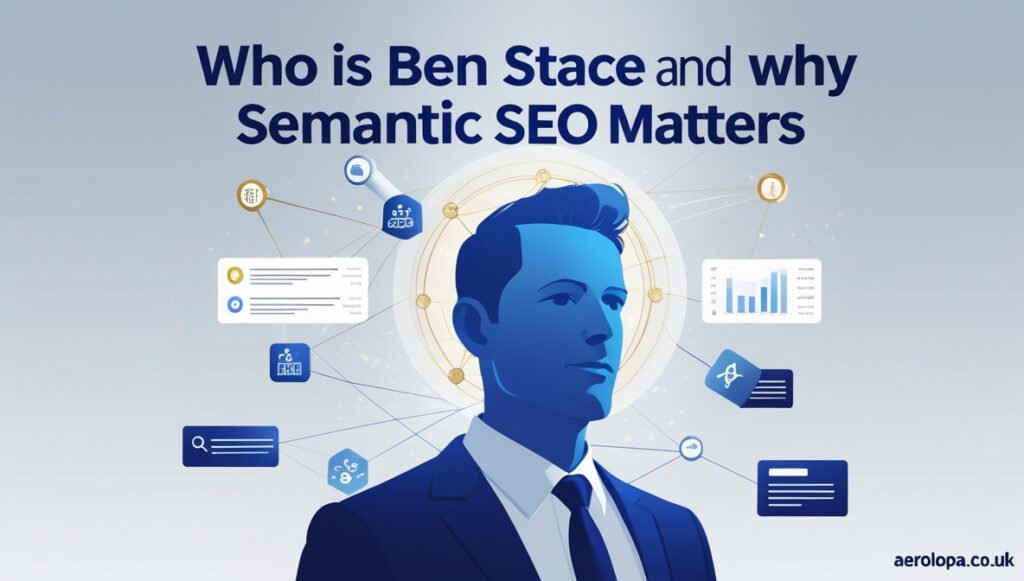There was a time when any level of digital content publishing could create some demand, but those days are over. Search engines are smarter, and users expect to find highly relevant, authoritative, and digestible information. To become a value-adding digital business, you need to fundamentally rethink your digital publishing strategy, taking into account topical depth, semantic relationships, and authoritative expertise in content development. That’s exactly where Ben Stace Semantic SEO Expert strategies come into play.
This long-form guide will help you understand semantic SEO, why it matters, how Ben Stace’s approach makes a difference, and the step-by-step methods you can use to become the most trusted source in your niche.
Who Is Ben Stace and Why Semantic SEO Matters

Ben Stace has built a reputation as a semantic SEO expert with a focus on content networks, topical authority and structured interlinking. Stace’s approach to keyword targeting goes beyond simply focusing on keywords to thinking about meaning, relationships and user intent.
Semantic SEO is important because:
- Search engines now prioritize context over exact keywords.
- Users want complete answers, not fragmented posts.
- AI-driven search (like Google’s AI overviews and voice assistants) pulls from the most authoritative, semantically structured sources.
By adopting the strategies of a Ben Stace Semantic SEO Expert, you not only rank higher but also become the default choice for both search engines and human readers.
What Is Semantic SEO?
Semantic SEO involves producing material that:
- Understands user intent behind a search query.
- Connects related topics through semantic keywords, concepts, and entities.
- Builds topical authority by covering a subject thoroughly.
- Signals expertise and trustworthiness through structure, references, and interlinking.
Instead of writing one-off keyword posts, semantic SEO requires you to map out an entire ecosystem of content that search engines can recognize as comprehensive and authoritative.
Core Pillars of Ben Stace Semantic SEO Expert Approach
1. Topic Clusters and Semantic Content Networks
At the heart of semantic SEO is the idea of topic clusters. You create a pillar page that covers a broad subject, supported by multiple in-depth articles on subtopics. These are interlinked in a way that highlights their relationships.
Example:
- Pillar Page: “Ultimate Guide to Digital Marketing”
- Cluster Articles:
- “How Search Engines Understand Content”
- “Role of Natural Language Processing in SEO”
- “What Is Topical Authority and Why It Matters”
- “Link Building for Semantic SEO”
By linking these together, you create a semantic content network that both humans and search engines can easily navigate.
2. Entity-oriented optimization
Today’s search engines place high emphasis on entities (people, places, organizations, concepts). When you are clearly signifying entities in your content and illustrating the relationships logically, you are sending very strong contextual signals.
For example, if you’re writing about “cryptocurrency,” you might connect entities such as:
- Bitcoin
- Ethereum
- Blockchain
- Crypto wallets
- Global regulations
This tells search engines that your page covers the topic comprehensively.
3. Contextual Internal Linking
The Ben Stace Semantic SEO Expert framework uses internal linking strategically. Instead of random links, each connection is semantic and contextual. This helps:
- Reinforce topical authority
- Spread link equity across your network
- Guide both users and bots through your content logically
4. Structured Data and Schema
Schema markup provides machines with structured signals about your content. Whether it’s an FAQ, article, product, or how-to, adding structured data ensures that your content is machine-readable, increasing chances of rich snippets and AI overview inclusion.
5. Earning Trust and Authority
Semantic SEO is not just about machines. To build long-term success, your site must earn trust. That includes:
- Publishing fact-checked, updated content
- Having expert authorship
- Credible citations
- Real-world authority
This creates a trust ecosystem, which establishes you as the authority in your industry.
Benefits of Using Ben Stace Semantic SEO Expert Strategies
As you put this method into action, you’ll start to see advantages like:
- Higher Rankings over Topics – Instead of ranking for one keyword, you will start to own entire clusters of keywords.
- Increased Visibility in AI Search – AI assistants like the syntax being semantically structured, and being authoritative with the information being conveyed.
- Faster Indexing of Content – Semantic links and having a schema for the search engines will help them to crawl & rank your content faster.
- Increased User Trust – Comprehensive content keeps users engaged longer, reducing bounce rates.
- Compounding Growth – Each new article strengthens your overall authority.
Step-by-Step Guide to Implement Semantic SEO
Here’s a practical framework you can start applying today:
Step 1: Identify Your Core Topics
Pick the 3–5 main subjects that define your business or niche.
Step 2: Build a Topic Map
List all subtopics, questions, and entities related to your main topic.
Step 3: Create a Pillar Page
Write a long, detailed page covering the entire subject.
Step 4: Write Supporting Articles
Develop 10–20 cluster articles that dive deeper into subtopics.
Step 5: Interlink Strategically
Ensure every sub-article links back to the pillar and to each other where relevant.
Step 6: Optimize for Entities
Use semantic keywords, structured data, and contextually related terms.
Step 7: Maintain and Update
Update your clusters regularly to reflect new trends, regulations, or discoveries.
Also Read: Ben Stace Topical Authority SEO: Build Lasting Trust
Real-World Example of Semantic SEO in Action
Consider a website dedicated to sustainable living. Instead of writing random posts, it builds:
- Pillar: “The Ultimate Guide to Sustainable Living”
- Clusters:
- “Zero-Waste Household Tips”
- “Eco-Friendly Travel Hacks”
- “How Renewable Energy Works”
- “Top 10 Sustainable Fashion Brands”
This site becomes the authority in sustainability, earning backlinks, media mentions, and strong rankings across the board.
The Future of Semantic SEO

With AI-driven search becoming dominant, semantic optimization will only grow in importance. Search engines will rely more on relationships, context, and topical authority rather than keywords alone.
The Ben Stace Semantic SEO Expert approach ensures you’re prepared for this future by building a resilient, trusted, and semantically rich digital presence.
Conclusion
Success in modern search is about more than keywords. It’s about becoming the most reliable, authoritative, and semantically structured source in your niche. By following the Ben Stace Semantic SEO Expert framework, you can:
- Build authority across entire topics
- Earn trust for the long-term from search engines and users
- Future-proof your site for AI-driven search
If you want to be in a position to never stop gaining traction and trust with search engines and users, then this is not only a recommended strategy; it’s essential.




